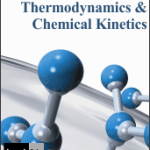Editor Overview
IJTCK maintains an Editorial Board of practicing researchers from around the world, to ensure manuscripts are handled by editors who are experts in the field of study.
Publisher
JournalsPubAn Imprint of Dhruv Infosystems Pvt Ltd
A-118, 1st Floor, Sector-63, Noida, U.P. India,Pin-201301
E-mail: [email protected]
(Tel):
(Mob) (+91) 9810078958, +919667725932
Focus and Scope

About the Journal
International Journal of Thermodynamics and Chemical Kinetics welcomes research papers and review articles concerning the development in the field of thermodynamics and chemical kinetics. Maximum entropy thermodynamics, non-equilibrium thermodynamics, reaction’s mechanism, gas phase kinetics and solution kinetics are a few topics that are included in the journal.
All contributions to the journal are rigorously refereed and are selected on the basis of quality and originality of the work. The journal publishes the most significant new research papers or any other original contribution in the form of reviews and reports on new concepts in all areas pertaining to its scope and research being done in the world, thus ensuring its scientific priority and significance.
Focus and Scope
- Atmospheric thermodynamics: Adiabatic evolution, Instability, indices Stüve, diagram, entropy production, entropy flow; second law of thermodynamics; meteorology, Climate; GHG; thermodynamics; model; atmosphere, thermodynamics, interactions, Earth system science, ecosystems, specific heat, the ratio of specific heats, dynamic viscosity, thermal conductivity – a measure of how quickly a material can absorb heat from its surroundings, Prandtl number, density, kinematic viscosity, thermal diffusivity.
-
Biological thermodynamics: Thermodynamics, physiological systems, entropy, exergy, negentropy, cercariae development, emergence shedding, temperature, climate change, Entropy, Entropy generation Exergy, Constructal law, Irreversible, biochemical engineering, thermodynamics, Econophysics, BIOCHEMICAL MICROCALORIMETRY, tissue cultures, biological macromolecules, transductions, Melting Ice Cube, metabolism, states that energy, transform electrical energy, radiant energy, spontaneity, irreversibility and the laws defining therein.
-
Chemical thermodynamics: Statistical mechanics; irreversibility; the arrow of time; chemical dynamics, Black holes thermodynamics; Entropic force; Electromagnetic-gravity analogy; General Relativity; Massive electrodynamics, Gravitational collapse; Oppenheimer-Snyder; horizonless solutions; neutron stars, quantum thermodynamics; hidden variables; superconductivity, longevity; aging; cancer; complex systems; non-equilibrium thermodynamics; biological phase transition; ferroptosis.
-
Equilibrium thermodynamics: Energy; Equilibrium; Gradients; Non-Equilibrium Thermodynamics; Entropy, carbon-based entity; driving force; energy; evolution; fitness; mechanism; natural selection; speciation; thermodynamics; theory, relativistic cell potential; relativistic thermodynamics; time dilation; graviton; virtual photon, Physical Foundations; Quantum mechanics; Nonlocality; Time; Entropy; Complexity; Origin of Life, foundations of thermodynamics; Boltzmann vs. Carnot; engineering thermodynamics; quantum thermodynamics; Principle of Least Action; complementarity; Maupertuis; Lazare Carnot.
-
Maximum entropy thermodynamics: Nanothermodynamics; fluctuations; maximum entropy; finite thermal baths; corrections to Boltzmann’s factor; ideal gas; Ising model; Gibbs’ paradox; statistics of indistinguishable particles, nanothermodynamics; information entropy production; Discrete Markov Chains; spike train statistics; Gibbs measures; maximum entropy principle, Synergy, Maximum entropy model; K-means clustering; accuracy; classification; sports forecasting, Quantile estimation; confidence interval; Monte Carlo simulation; precipitation frequency analysis.
-
Non-equilibrium thermodynamics: Entangled polymer melts; concentrated polymer solutions; non-equilibrium thermodynamics; polymer tumbling; transient shear viscosity undershoot, spontaneous; non-enzymatic; post-translational modifications; racemization; biological clock; natural selection; allostatic load; psychological aging; psychological stress; stress response system; phase transitions, non-equilibrium phase behavior; compositional flow simulations; phase transitions; upscaling; hydrocarbon mixtures; non-equilibrium constant volume depletion, non-extensive entropy principle; plasma turbulence; quasi-equilibrium, the origin of life; dissipative structuring; prebiotic chemistry; abiogenesis; non-equilibrium thermodynamics; thermodynamic dissipation theory.
-
Reaction’s mechanism: Sport differential; torque vectoring; friction clutch; vehicle kinematics, surface plasmon resonance; thin film; dropwise condensation; monolayer; dropwise condensation mechanism; nucleation; film rupture theory; degradation of dropwise condensation, actuation and driving mechanism; soft robotics; soft epicyclical mechanism; Shape Memory Alloy, Relativity, EPR, Superluminal, Ether, Sudarshan, Effective mass, time dilation, length contraction, volt-ampere characteristics; battery mathematical model; mechanism function; fuel cell, solar panel; laminate vibrations; self-cleaning; cymatics, spontaneous regression; tumors; cancer; bacterial therapy; Coley; immunotherapy; hyperthermia; oncology.
-
Gas Phase Kinetics: Statistical complexity; Order-disorder contrast; Phase transitions; van der Waals gas, carbazole; OH radical; rate constants; oxidation mechanism; density functional theory (DFT), Sulfur; Hydrogen cyanide; Gas production; Ammonia nitrogen; Propionic acid, self-consistent physical model; bubbles; gas-solid two-phase flow,air-acetic acid system; gas holdup; differential pressure transmitter; ERT; optical fiber probe, shale compaction; kinetics, activation energy; pore interfaces; grain interfaces; fractals, beer; nuclear magnetic resonance; solid-phase microextraction; gas chromatography, Fabric phase sorptive extraction; Gas Chromatography-Mass Spectrometry; Organochlorine pesticides; Sample preparation, Lanthanide; Samarium (Sm)-doped Fe3O4 nanoparticles; Epoxy coating; Anticorrosion; Curing reaction.
Open Access Statement
IJTCK is an open-access (OA) publication which provides immediate open access to its content on the principle that making research freely available to the public supports a greater global exchange of knowledge. All published works will be available to a worldwide audience, free, immediately upon publication. Publication in the journal is subject to payment of an article processing charge (APC). The APC serves to support the journal and ensures that articles are freely accessible online in perpetuity under a Creative Commons licenses.
Publication Ethics Statement
IJTCK fully adhere to Code of Conduct of Publication Ethics (COPE) and to its Best Practice Guidelines. The Editorial Team enforces a rigorous peer-review process with strict ethical policies and standards to ensure the addition of high-quality scientific studies to the field of scholarly publication. In cases where ctit becomes aware of ethical issues, it is committed to investigating and taking necessary actions to maintain the integrity of the literature and ensure the safety of research participants. Click here to read more about the Research & Publication virtue ethics
Content Disclaimer
All IJTCK the information’s, opinions, and views mentioned here represents the authors and the contributions of the articles. Publication of articles, advertisements, or product information does not constitute endorsement or approval by the journal. cannot be help responsible for any error or consequences while using the information updated in this journal. Although every effort is done by ctit to see that there’s no any inaccurate data, misleading data, opinion or statement within the journal, the data and opinions appearing in the articles are the responsibility of the contributors concerned.



